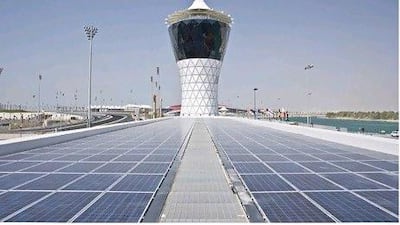When construction is complete on Shams 1, the massive solar energy project in progress in Abu Dhabi's Western Region, the most remarkable thing about it will be invisible to the eye.
Behind the rows of curved mirrors that will cover the sand is a US$600 million (Dh2.2 billion) loan - the biggest financing deal for a renewables project in the Middle East.
Accounting for three-quarters of all regional financing for renewables in the first half of the year, the emirate-backed project illustrates the status of clean energy lending in the region - there is not much of it, and it needs the Government's help.
"The Mena region at the moment is at a very early stage in renewable energy activity," says Logan Goldiescott, the lead regional analyst for the Middle East and North Africa at Bloomberg New Energy Finance in London. "All the major projects which are being undertaken are being undertaken by large, state-backed organisations."
Renewable power plants typically cost little to run but a lot to install. Thus, the future of clean energy hinges on making many more such deals for public and private companies alike, say developers. Fronting the initial costs can be difficult for a homeowner with dreams of rooftop solar panels or a businessman pitching a wind farm.
"If you take that cost in the first year, nobody wants to do it," says Karel de Winter, the division manager for Alsa Solar, a UAE solar company. "If you spread out that cost over 10 years, then [it] is economical. So it's mainly a financing issue that they're having here."
One way to woo investors is for the Government to promise to pay electricity producers for every kilowatt of clean energy - a mechanism called a "feed-in tariff". Such government guarantees help bring the price of renewables in line with fossil fuels and have spurred leaps in solar power in Germany and Spain.
In Shams 1's case, a "green payment" from the Abu Dhabi Government - essentially a project-specific feed-in tariff - was one of the reasons it attracted $900m in commitments.
"Most of the bankers who are keen to be involved, European and otherwise, they're all saying give us a feed-in tariff and we'd love to do some deals out here," says Karim Nassif, a credit analyst at Standard & Poor's in Dubai. "Without the feed-in tariff, they don't know that there's going to be stability."
Abu Dhabi, which hopes to draw 7 per cent of its electricity from renewables by 2020, is expected to issue a renewable energy policy later this year. That could mean sticking to the project-by-project "green payments", which favour large-scale projects developed by government-owned companies, or a feed-in tariff, which could open up the market to more private companies or people looking to put up a few solar panels in their backyards.
Meanwhile, the region has attracted a few private equity funds willing to venture off the beaten track.
In June, Zouk Capital, a private equity fund manager based in London, raised a clean technology fund worth €230m (Dh1.15bn). The fund, which is Europe's largest dedicated clean tech fund, raised €30m more than its original target.
Its resources have come to Abu Dhabi through Enviromena, a UAE solar company in which it has invested. Enviromena's solar panels help power the Yas Marina Formula One circuit and Masdar City, the planned carbon-neutral development on the outskirts of the capital.
Another source of hope for renewables could perversely come from the European debt crisis.
Clean-tech investment funds that once looked to Europe as an investment haven may become more inclined to put their money in the Gulf, says Marc Fevre, a partner at the law firm Baker & McKenzie.
"The fundamentals of many countries developing renewable energy in Europe may have been affected by the euro-zone debt crisis," he says, prompting many to rethink their investing strategies.
Renewable energy projects in Gulf nations "may look, relatively, much more attractive than some countries in Europe".

